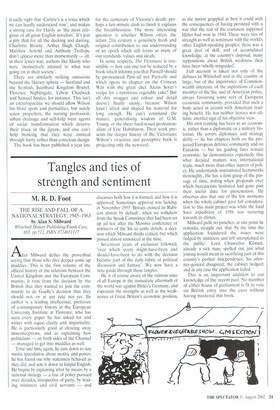Tangles and ties of strength and sentiment
M. R. D. Foot
THE RISE AND FALL OF A NATIONAL STRATEGY, 1945-1963 by Alan S. Milward
Whitehall History Publishing/Frank Cass, £65, pp.512, ISBN 0714651117
Aan Milward defies the proverbial saying that those who dive deeper come up muddier. This is the first volume of the official history of the relations between the United Kingdom and the European Community; it runs from the decision by the British that they wanted to join the community to de Gaulle's decision that they should not, or at any rate not yet. Its author is a leading intellectual, professor of contemporary history at the European University Institute at Florence, who has seen every paper he has asked for and writes with equal clarity and impartiality. He is particularly good at clearing away misconceptions, and at explaining how politicians — on both sides of the Channel — managed to get into muddles as well.
Time and time again, he cuts down to size media speculation about motive and power; he has found out why statesmen behaved as they did, and sets it down in limpid English. He begins by explaining what he means by a national strategy — a line of policy pursued over decades, irrespective of party, by leading ministers and civil servants — and discusses both how it is formed, and how it is approved. Sometimes approval was lacking; in November 1955 'Britain crossed its Rubicon almost by default', when we withdrew from the Spaak Committee that had been set up ad hoc after the Messina conference of ministers of the Six to settle details, a decision which Milward thinks critical, but which passed almost unnoticed at the time.
Seventeen years of exclusion followed, 'over which every might-have-been and should-have-been to do with the decision became part of the daily fabric of political discussion and fantasy'. We now have a sure guide through these tangles.
He is of course aware of the ruinous state of all Europe in the immediate aftermath of the world war against Hitler's Germany, and expounds the strengths as well as the weaknesses of Great Britain's economic position, as the nation grappled as best it could with the consequences of having persisted with a war that the rest of the continent supposed Hitler had won in 1940. There were ties of strength as well as sentiment with the world's other English-speaking peoples; there was a great deal of skill, and of accumulated knowledge, at the country's disposal; many suppositions about British weakness then have been 'wholly misguided'.
Full account is taken not only of the debates in Whitehall and in the country at large, but of the importance of Commonwealth interests; of the aspirations of each member of the Six; and of American policy, always favouring some sort of European economic community, provided that such a body acted in accord with American trading benefit. He has neither heroes nor villains; another sign of his objective view.
His own training has been as an economic, rather than a diplomatic or a military historian. He covers diplomacy and strategy deftly — he has chapters both on the projected European defence community and on Euratom — but his guiding lines remain economic; he demonstrates repeatedly that what decided matters was international trade, much more than other aspects of policy. He understands institutional frameworks thoroughly. He has a firm grasp of the passage of time, noting when proposals over which bureaucrats hesitated had gone past their useful date for presentation. He observes also that one of the few moments when the whole cabinet gave full consideration to this main project was while the fatal Suez expedition of 1956 was teetering towards its climax.
Milward pulls no punches; at one point he remarks, straight out, that 'by the time the application foundered the issues were fudged by ministers and left unexplained to the public'. Lord Chancellor Kilmuir, already a sick man, spelled out just what joining would mean in sacrificing part of this country's perfect independence; his attorney-general disagreed; the cabinet hedged; and in any case the application failed.
This is an important addition to our knowledge of the recent past. No member of either house of parliament is fit to vote on British entry into the euro without having mastered this book.


























































 Previous page
Previous page